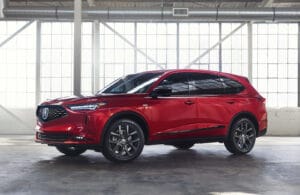
It’s been a challenging year for an auto industry and, like pretty much everyone else, you can expect some real celebrations as we enter 2021, even though it could be many months before things come close to what might be called “normal” again.
Between work-at-home orders and factory shutdowns, 2020 hammered the industry — among other things leading to significant shortages of SUVs, CUVs and pickups. The COVID-19 pandemic also put a number of key product programs behind schedule, some models due out at the beginning of the model year likely not to show up until the first quarter or even later.
If anything, that means 2021 will bring a veritable avalanche of new offerings. As you’d expect, they’ll be skewed towards light trucks, that segment now accounting for roughly three out of every four new vehicles sold in the U.S. But we’ll still see some significant new sedans, coupes and even a few sports cars. And 2021 will see a rapid ramp up in the rollout of long-range battery-electric vehicles and other green products.
(BMW “significantly increasing” EV production.)
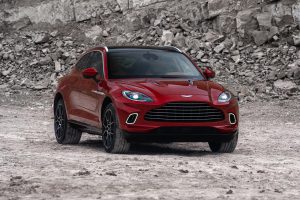
Here’s a look at the most important new models set to come next year:
Acura: Honda’s luxury brand brought the new RDX to market in 2020, introducing a new design language. Next up is the marque’s flagship, an all-new version of the Acura MDX crossover.
Alfa Romeo: Just as FCA completes its merger with PSA, the Alfa brand will introduce its first plug-in hybrid, the Tonale CUV.
Aston Martin: The British marque officially launched its first-ever SUV this year, though availability of the DBX will be limited until early next year. Around the same time, expect to see two specialty models, the 1,160-horsepower Valkyrie
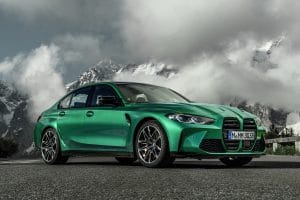
hypercar, and the V-12 Speedster.
Audi: While the Q5 Sportback will likely generate the big sales, the German luxury brand will continue to expand its all-electric line-up with two new models, the Q4 e-tron and the production version of the e-tron GT sports car first revealed at the 2018 Los Angeles Auto Show.
BMW: Like its rival Audi, BMW will launch a mix of conventional and electrified vehicles. It will start off in March with new versions of the iconic M3 sedan and M4 coupe, following later in the year with its long-range iNext battery-electric vehicle.
Bollinger: We only recently got a first look at the production version of the Bollinger B1 pickup but it’s as brutish as the early prototype. It will make its formal sales debut, along with the B2 SUV this year.
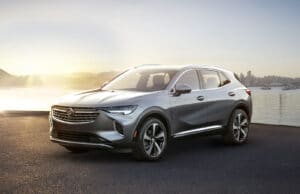
Buick: After abandoning its last passenger car model this past year, the GM brand will push to update its SUV line-up, focusing in 2021 on the Chinese-made Envision.
Cadillac: You’ll have to wait until 2022 for Caddy’s first all-electric model, the Lyriq. In the meantime, the domestic luxury leader will push deeper into performance territory with the launch of the new Blackwing series with version of the CT4-V Blackwing and CT5-V Blacking coming by summer.
Chevrolet: The bowtie brand will weigh in with the first in a new wave of General Motors EVs, the stretched Bolt EUV. The full-size Silverado pickup, meanwhile, will get an early refresh, inside and out.
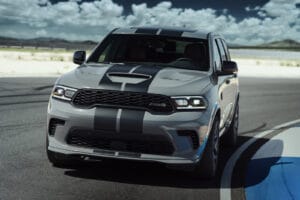
Dodge: Now a brand focused exclusively on muscle cars, Dodge will bring out the newest member of the Hellcat family, the Charger SRT Hellcat Redeye, as well as a muscle SUV, the Durango SRT Hellcat.
Ferrari: Even this most exclusive of sports car brands is getting into the EV race, Ferrari set to roll out a plug-in version of the SF90 Stradale. In more traditional territory, look for the new Portofino M mid-year.
Ford: Has a lot riding on the 2021 model year. It officially launched its first long-range BEV, the Mustang Mach-E, this past month but few dealers have any in stock yet. Meanwhile, the high-performance Mach-E GT won’t arrive til mid-year. And while the little Bronco Sport is now in showrooms, the bigger Bronco 2- and 4-door models were pushed back until summer. And some versions of the newly redesigned F-150, including the Powerboost hybrid, really won’t be stocked until the new year.
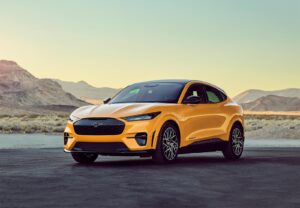
Genesis: COVID headaches meant only limited availability of the brand’s first SUV, the GV80, in 2020. But the second ute is already on the schedule, the smaller GV70 coming later this year. And the first Genesis BEV will hit showrooms later in 2021. No official word but it’s expected to also be an SUV.
(Dodge returns to the Gold standard for 2021.)
GMC: General Motors’ “professional grade” truck brand came close to breaking the internet with the online debut of its battery-electric Hummer pickup which will make an appearance late in the year. GMC also plans a mid-cycle tweaking of its conventional pickup, the Sierra.
Honda: Officials insist the third-largest of the Japanese automakers remains fully committed to its passenger car line-up and will underscore that with the launch of the 11th-generation Civic line. As usual, a variety of body styles and
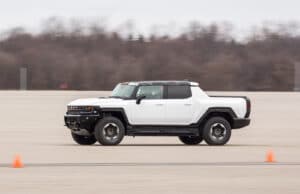
performance packages will follow, stretching into 2022.
Hyundai: Hyundai is another brand with a busy schedule for the 2021 model year which began with the new Elantra and not just one but two higher performance variants, the N and N Line. Next up: an all-new version of its best-selling Tucson SUV. But expect even bigger headlines when the long-awaited Santa Cruz, a small pickup, finally makes it to showrooms, along with the Ioniq 5, the first in what will become a dedicated sub-brand for all-electric vehicles.
Infiniti: Nissan’s luxury brand is readying a mid-cycle update of the QX60 crossover – but it’s putting a spotlight on the all-new QX55, a coupe-like crossover that will introduce a new and more distinctive design language.
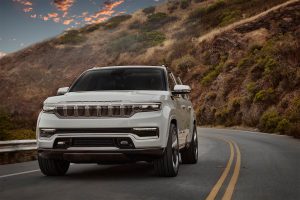
Jeep: Making a full 470 hp, the V-8-powered Wrangler Rubicon will be the most muscular version of the SUV icon ever. It will be just one of an array of launches from Jeep that will also see a new Grand Cherokee coming late in the year, possibly with a first-time three-row version in the plan. For those needing the extra row, hang tight for the long-awaited return of the Jeep Wagoneer as well as the more luxurious Grand Wagoneer.
Kia: The Korean carmaker plans to welcome in the New Year by hauling a “2021” signboard across the country. It will usher in several new offerings. An updated version of Sedona minivan is in the works, as is Kia’s newest EV – and its first on a dedicated, skateboard-style platform.
Lexus: A relatively minor year will see just one notable new product: a redesign of the small NX crossover.
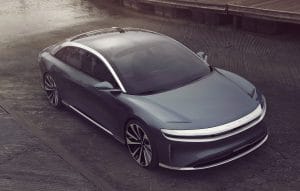
Lucid: While production dates could vary, the Tesla rival is looking to make an electrifying entry into the market with its Model S fighter, the Lucid Air. The top-line version will offer hypercar acceleration as well as an optional battery pack Lucid expects to deliver more than 500 miles per charge.
Maserati: Like its high-line rivals, Maserati realized even sports car fans want SUVs and it will be adding its second model, the new Grecale, later in the year. Earlier in 2021, however, look for the new MC20 coupe.
McLaren: Like archrival Ferrari, McLaren has recognized that electric propulsion can no longer be avoided. But it’s also realized that it can deliver great performance benefits. The British marque’s first plug-in hybrid, the Artura, will arrive around May.
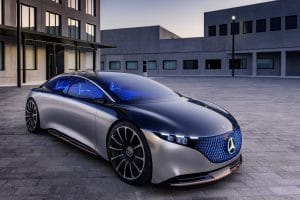
Mercedes-Benz: The German luxury marque will roll out three new all-electric models this coming year, the EQA, EQB and EQS, part of what is to grow into a full sub-brand of battery-electric vehicles, Mercedes-EQ. Equally important will be the debut of the all-new – and decidedly high-tech – S-Class early in the coming year. An even more exclusive Maybach version will follow.
Mitsubishi: Heavily influenced by the oddly named Engelberg Tourer, Mitsubishi will roll out an all-new version of its Outlander crossover this coming year. Underneath, it will share key components of the Rogue SUV built by Mitsubishi affiliate Nissan. As with the current model, expect a plug-in hybrid option.
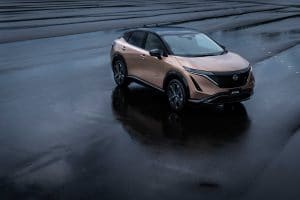
Nissan: The second-largest Japanese automaker offered the world’s first mainstream battery-electric vehicle – but has added nothing else since the debut of the original Leaf. Until now, that is, as 2021 will bring the debut of the all-new, all-electric Ariya crossover. New versions of the Nissan Pathfinder SUV and Frontier pickups also are in the plans for the New Year.
Porsche: Porsche loves to stretch out the product cadence for core models like the 911 and the brand icon’s latest entry, the 911 Turbo, will arrive soon after the ball drops. Meanwhile, the German marque has two electrified entries also in the works: starting with the Panamera 4S E-Hybrid and then following with an all-electric SUV, the Taycan Cross Turismo.
Rivian: Yet another new player determined to take on Tesla, Rivian will roll out two all-electric models in 2021, the R1T pickup due in June, and the R1S SUV following a couple months later. Rivian also is getting ready to deliver the first of what are supposed to be 100,000 all-electric delivery trucks for Amazon’s Prime service.
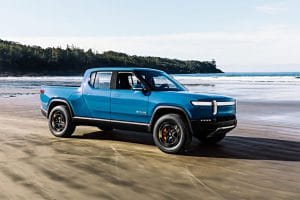
Subaru: The Japanese automaker is weighing in with the BRZ which, again, shares underpinnings with the Toyota 86. But the partners notes the two sports cars are a bit more visually differentiated this time.
Tesla: The automaker claims to have taken hundreds of thousands of orders for its new Cybertruck and would thus like to get the pickup in production ASAP. But the California EV maker has a history of missing its target dates and, as Automotive News reports, construction of a new assembly plant to build the Cybertruck may push the launch into 2022.
Toyota: The Japanese giant’s little 86 sports car will be back in new form but will again share platforms with the Subaru BRZ. The bigger news – quite literally – will be the launch of the next-generation Toyota Tundra. Expect some “important developments,” according to a senior Toyota exec, hinting that Toyota may have more variants aimed at finally chipping away at Detroit’s dominance in the huge – and highly profitable – full-size pickup segment.
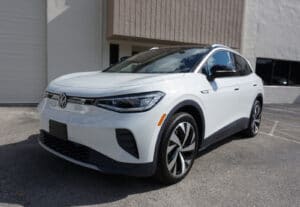
(Nissan offering two versions of the 2021 Leaf EV.)
Volkswagen: Look for an assortment of new models, starting early in the year with the slightly delayed launch of the ID.4, VW’s first long-range all-electric model for the U.S. market. With its SUVs now driving the brand, Volkswagen hopes to gain more traction with the all-new Taos model slipping in under the current Tiguan line. And a limited range of Golf models, specifically the GTI and R lines, will follow in 2021.
Volvo: The Swedish marque has big plans to electrify its line-up and recently announced that its new XC40 Recharge line will soon be followed by an even smaller all-electric model. How soon is uncertain but the C40 electric crossover is clearly on tap for 2021.








better hope the market is both big and strong enough to support
all these brands.